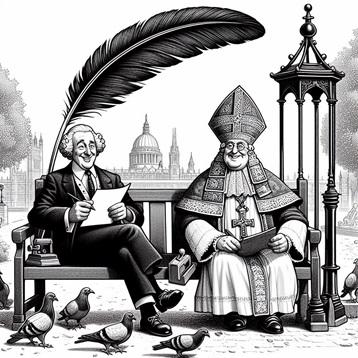A Notary is a qualified lawyer and a member of the oldest branch of the legal profession in the United Kingdom. In this article we explore the role, qualifications and historical context of notaries.
Role of a Notary
- Authentication and Certification:
- Notaries specialise in authenticating and certifying signatures, authority, and capacity related to documents for use abroad.
- They ensure the validity and reliability of legal documents in international transactions.
- General Legal Practice:
- Notaries are authorised to conduct general legal practice, excluding court proceedings.
- Their work spans various areas, including conveyancing (property transactions) and probate (handling wills and estates).
- Commissioner for Oaths:
- Notaries can exercise the powers of a Commissioner for Oaths.
- They administer oaths and affirmations for legal purposes.
Role of a Scrivener Notary
Scrivener Notaries specialise in foreign law and may become freemen of the Worshipful Company of Scriveners.
- Authentication and Certification:
- Scrivener Notaries focus on authenticating and certifying signatures, authority, and capacity related to documents for use abroad.
- They ensure the validity and reliability of legal documents in international transactions.
- Advanced Legal Practice:
- Scrivener Notaries are authorized to conduct general legal practice, excluding court proceedings.
- Their work extends to areas such as conveyancing (property transactions) and probate (handling wills and estates).
- Multilingual Skills:
- Scrivener Notaries are trained in advanced aspects of notarial practice and are proficient in at least two foreign languages.
- Their linguistic qualifications ensure effective communication in international contexts.
Historical Roots
- The office of a notary public traces its origins to ancient Rome.
- In England and Wales, notaries were appointed on papal authority by the Archbishop of Canterbury until 1533.
- The Faculty Office has its origins in the Ecclesiastical Licences Act 1533.
- After the break from Rome, appointments continued under the authority of the Crown.
- The Archbishop’s jurisdiction is exercised through the Court of Faculties, one of the oldest English courts.
- Since 1801, statutes enacted by Parliament underpin the appointment and regulation of notaries.
Qualifications and Regulation
- Education and Training:
- Applicants generally hold a university degree or are qualified solicitors or barristers.
- They must obtain a Diploma in Notarial Practice after prescribed study (offered by the University of London).
- A formal warrant (faculty) under the seal of the Archbishop of Canterbury confirms their appointment as a Notary Public.
- Appointment and Regulation:
- Notaries are appointed by the Court of Faculties of the Archbishop of Canterbury.
- They are subject to regulation by the Master of the Faculties.
- Similar to solicitors, notaries must comply with stringent practice rules and maintain fidelity cover for client protection.
- Insurance and Compliance:
- Notaries must be fully insured.
- They keep clients’ funds separate from their own.
- Annual practising certificates are renewed only if they adhere to rules and demonstrate satisfactory character.
Governance and Renewal
- The Faculty Office oversees notaries’ training, qualification, and governance.
- The Registrar issues the annual practising certificate.
- Notaries renew their certificates annually by complying with rules and regulations.
Notaries vs. Solicitors
- Notaries:
- Primarily concerned with international transactions and document authentication.
- Some notaries also handle general legal practice.
- Notaries may or may not be solicitors.
- Scrivener notaries are a specialized group within the profession.
- Solicitors:
- Provide specialist legal advice across various areas of law.
- Represent and defend clients’ legal interests.
- Work closely with clients and are often their first point of contact.
- Advise on personal matters (e.g., wills, divorces) and commercial work (e.g., mergers, acquisitions).
General Notaries vs. Scrivener Notaries
- General Notaries:
- Most general notaries also practice as solicitors.
- Their work includes authentication, certification, and general legal practice.
- Some general notaries do not practice as solicitors.
- Scrivener Notaries:
- Specialized in advanced notarial services.
- Proficient in foreign law and languages.
- Scrivener Notaries may or may not be solicitors.
Notary Links
The Notaries Society
The Society of Scrivener Notaries
The Faculty Office of the Archbishop of Canterbury
Check out our articles on Legal Professionals, Direct Access Barristers, Barristers, Solicitors, Rule of Law and the highly questionable Sussex Family Justice Board.
Read the reviews of Junior Sussex Barrister Gavin Howe
“He is awful, underhanded and should not be practising law!”
and Legal 500 Junior Barrister Eleanor Battie
“She is a one-woman legal A Team”
Latest Articles
- What is a Paralegal ?A paralegal is a legal professional who performs tasks that require knowledge of legal concepts but does not hold the… Read more: What is a Paralegal ?
- What is a Judgment ?A judgment, also known as a judicial decision or court ruling, is the final decision made by a court of… Read more: What is a Judgment ?
- What is an Adverse Inference ?Adverse inference is a legal principle that plays a significant role in various areas of law, including criminal, civil, and family law. It arises… Read more: What is an Adverse Inference ?
- BarristersA barrister is anyone who has been Called to the Bar in England and Wales. For a barrister to offer… Read more: Barristers




